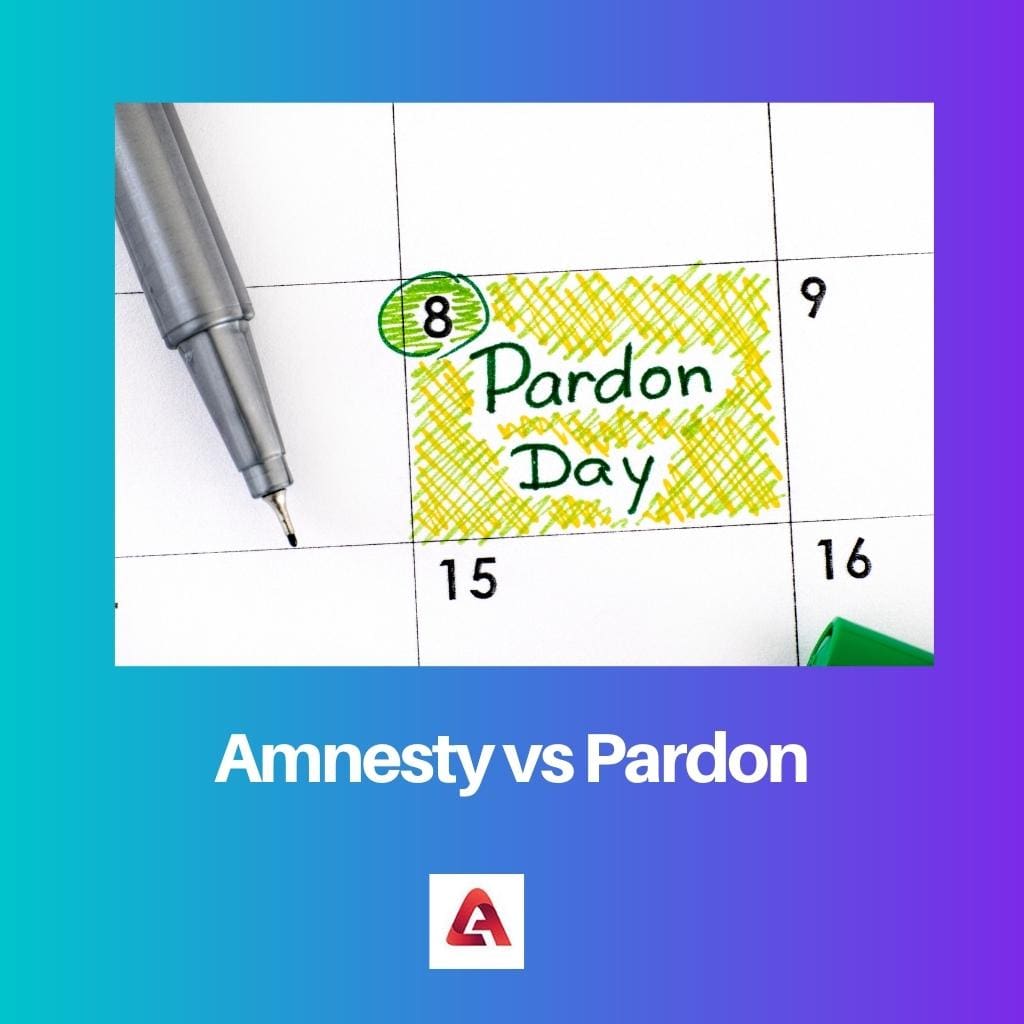Guilt might be one of the hardest feelings for anyone on this earth to deal with. Committing a crime and feeling guilty is one of the hardest feelings that traps a person inside and wraps with guilt making it harder.
Forgiveness is like the key that frees a person from guilt and might relieve a person from a great burden.
Key Takeaways
- Amnesty is a general pardon for a group of people for a specific offence, while a pardon is an official forgiveness for an individual’s offence.
- The government grants amnesty for political offences or crimes committed during a specific period, while a pardon can be granted for any violation.
- Amnesty is broader than a pardon and is granted to many people, while a pardon is granted to an individual.
Amnesty vs Pardon
Amnesty refers to a general pardon or forgiveness granted by a government to a large group or category of individuals who have committed certain offenses. A pardon is a specific act of forgiveness granted by the head of state or a government official to an individual who has been convicted of a crime.

Amnesty is the absolute forgiveness offered to a group of people. It signifies absolution and forgetfulness.
It s given to the people who have been conceited but have not faced any trial. It is formal and used for legal, lawful, and official purposes.
It has its origin from the Roman and Greek laws.
Pardon is a form of showing pity and forgiveness, especially for an individual. It is always given only after a judgment is passed for a particular case.
The person gets convicted for their actions, and that individual’s criminal record is maintained no matter what. Pardon has its origin in English.
Comparison Table
| Parameters of Comparison | Amnesty | Pardon |
|---|---|---|
| Definition | Amnesty is emphasized as absolute and sheer forgetfulness. | Pardon is synonymous with showing pity and offering forgiveness. |
| Offered To | It is offered to a group of people. | It is offered to an individual. |
| Trial and Conviction | The people to whom amnesty is offered are not subjected to trial and conviction. | Pardon is offered after the person faces a trial and gets convicted. |
| Usage and Criminal Records | It is used in politics, law, and official places. The criminal record and history of the person are discarded completely. | It is quite an informal method of offering forgiveness. The criminal record and history of the person are not discarded. |
| Origin | It has its origin from greek and roman laws. | It originated from the English system of laws. |
What is Amnesty?
Amnesty is a policy of offering forgiveness to people who carry guilt due to their past criminal offenses. It is inspired and derived by the ancient Greek and Roman laws that had similar policies.
It is a law of forgetfulness and oblivion that is offered by the government or the supreme authority. It is a conditional aspect of granting forgiveness, expecting the group of people who committed the crime to pull themselves back together and return to morally acceptable behavior, obedience, and proper genuine duty.
The groups offered amnesty are expected to make up for their crime within a time specified by the supreme authority or, in most cases, the government. Amnesty is granted due to crimes committed in the fields of state, such as treason, rebellion, political affairs, and also against the law.
Communities that take after the legislative law and constitution include this law and follow this practice. Amnesty has a lot of variance and difference when compared with a pardon.
In amnesty, the criminal records and history of the group are erased, and it is an act of forgetfulness. Amnesty is granted before the person can get convicted.
Here the person also doesn’t face any trials.

What is Pardon?
Pardon is the grant of forgiveness given by the government that gives a person the privilege o relieving himself from the legal consequences that are the result of a criminal conviction. It is granted before the person faces the trial and before conviction, and it might differ based on the laws of the jurisdiction.
It is granted in see dark countries across the globe.
Accepting a pardon also means accepting built and accepting their mistake. Nowadays, cases are handled by asking for appeal rather than pardon.
They aware especially used in eradicating corruption. They are also used in different opinions and situations with controversy.
A pardon is given, making sure the criminal has paid their best by doing something to compensate to society; otherwise, they are not granted a pardon. It is the executive power possessed by the power of a governor or a president who wishes to forgive a person who is charged with an offense that is either illegal or unlawful.
It is also considered as reducing the sentence time period and also reducing the punishment. Giving a pardon doesn’t mean that all the criminal record of the person is not reduced.

Main Differences Between Amnesty and Pardon
- Amnesty is absolute forgetfulness, and pardon is forgiveness and an expression of pity.
- Amnesty is used when forgiving a mass of people, and pardon is the way to forgive an individual.
- Amnesty is offered before the person gets to face a trial or conviction, but a pardon is offered after the conviction.
- Criminal records are erased after offering amnesty, whereas, in the case of offering pardon, the history and records are maintained.
- The Greek and Roman laws were used as a base to derive the concept of amnesty. Pardon is based on the law system of the English.
- https://heinonline.org/hol-cgi-bin/get_pdf.cgi?handle=hein.journals/colhr4§ion=31
- https://heinonline.org/hol-cgi-bin/get_pdf.cgi?handle=hein.journals/clmr6§ion=60

The information provided in the article is both insightful and educational. The legal distinctions between amnesty and pardon are made quite clear.
I couldn’t agree more, Yroberts. The historical and legal context provided in the article is very enlightening.
The article’s explanation of the legal and historical origins of amnesty and pardon is quite informative. It effectively distinguishes the two concepts.
I share your sentiments, Joanne17. The thoroughness of the article’s examination of amnesty and pardon is truly commendable.
The article explains the nuances of amnesty and pardon very comprehensively. Understanding these distinctions is essential for anyone interested in law and justice.
Absolutely, Jim. The historical origins of both amnesty and pardon are also quite fascinating.
Indeed, Jim. It’s crucial to have a clear understanding of these concepts, especially when it comes to their legal and political applications.
Thanks for this insightful article about the differences between amnesty and pardon. Your description and comparison of the two concepts is very clear and easy to understand.
I agree with you, Riley. It’s always interesting to learn these distinctions in legal terms.
This article presents a clear and detailed comparison between amnesty and pardon. It highlights the legal and political implications of each concept effectively.
I concur, Rking. The legal and historical aspects of both amnesty and pardon presented in the article are quite illuminating.
Absolutely, Rking. It’s insightful to learn about the origins and applications of amnesty and pardon, especially within the framework of the law.
The article provides an insightful comparison between amnesty and pardon, offering valuable knowledge about the legal and political implications of both concepts.
Indeed, Zchapman. The historical and legal analyses of amnesty and pardon provided in the article are intellectually enriching.
I appreciate the detailed information about the historical origins and legal distinctions between amnesty and pardon presented in this article. It’s intellectually stimulating and educational.
Absolutely, Frichardson. The article’s examination of amnesty and pardon is both informative and highly engaging.
The article’s detailed exploration of amnesty and pardon offers valuable insights into these legal concepts. It’s highly informative for individuals interested in law and politics.
I couldn’t agree more, Tyler Robertson. The examination of amnesty and pardon in this article is both enlightening and intellectually stimulating.
The article provides an excellent understanding of the differences between amnesty and pardon. The historical context and comparison table are incredibly informative.
I completely agree, Richardson Phoebe. The comprehensive analysis of amnesty and pardon is particularly engaging and enlightening.
The thorough explanation of the legal and historical aspects of amnesty and pardon in this article is truly enlightening. It clearly delineates the differences between the two concepts.